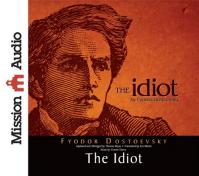
by Fyodor Dostoevsky
Audio CD- $28.57
Prince Myshkin, the title character, has finally returned to St. Petersburg after several years of exile in a Swiss sanitarium. As he resumes life in ...
Overall rating:
How would you rate this book?
Member ratings
I had wanted to read this book for the longest time. I loved the audiobook of “Crime and Punishment” and thought this would be as good. However, “The Idiot” was a bit disappointing. The reader was not as good and the number of Russian names and places were incomprehensible to my ear. In the printed edition, the names would have been more recognizable, so I recommend reading it, not listening to it.
The story is intricate and intense. The characters are not very likeable. They are pompous, devious and scheming all the time. They thrive on gossip and rumors. They are judgmental and cruel at times, and tend to angry outbursts and sometimes violence. They seem eccentric, unhappy and unfulfilled, disloyal, often rudely arrogant and completely untrustworthy. The upper class is viewed negatively, as shallow and conniving, rarely loyal and mostly self-serving.
The main character, Prince Myshkin is supposedly an Idiot. He calls himself that, however, he seems to have more common sense at times, than all the other characters. He suffers from epilepsy, and as a result, his education was limited, yet he seems to think more logically, in his innocence, than many of those he encounters throughout the book. He is easily admired because of his honesty, even as they laugh at his simplicity or naïveté. Each of the characters is a contrarian, taking the opposite point of view than the one prevailing in their conversations. They seem to enjoy the banter. They constantly contradict each other’s judgment so that what you think is happening is generally not exactly what does occur. The say one thing, mean another. Myshkin’s naive remarks invariably cause havoc and/or inspire respect. Many of the characters accuse each other of being mad. Prince Myshkin, who is supposedly the least sane, is perhaps the sanest of all until the very end when the severe emotional trauma of certain events causes what may be irreversible damage to his psyche.
There are some nasty references to Jews which I found disheartening, but I believe it was because of the time in which the book was written. Many books portrayed Jews negatively. (I wonder if Jews, like the blacks and now the American Indians have done, should lobby to alter the wording in these offensive books.) Jews were definitely not thought well of in the few places they are mentioned, and they were presented stereotypically in the view of the prevailing times.
Myshkin meets a stranger, Rogozhin, on the train taking him to Russia, and from that moment, his life takes an ultimately tragic turn. Both men become involved with the same woman, Nastasya Filippovna, a beautiful but flighty woman of changeable, perhaps demented, mind. Both men love her, one in a romantic way while the other believes he loves her because he pities her. Myshkin is in and out of another romantic relationship, with Aglaya. He, like Nastasya, has issues with being faithful and true to those to whom they pledge themselves. He is almost the comic foil; he can’t win for losing. He is the most compassionate and trustworthy, but his judgment is faulty and immature. He lacks he reason to truly think through the consequences of his actions; although he analyzes the situations he is in quite logically, he makes illogical conclusions.
Myshkin is the subject of what starts out as elaborate deceptions and schemes and then become reality. He is always somewhat of a victim and a hero, at the same time. There are so many ridiculous explanations and assumptions that the truth is elusive; facts are not facts, rumors take on a life of their own, the pomposity of the elite class is irritating. They are all responsible for their own failures and disasters. Their own behavior brings them down and they move each other around like pawns in a game of chess.
The book is brilliant but it should be read, not listened to so that the characters are more easily identified by name recognition. Sometimes the reader’s interpretation was frantic with emotion and often the dialogue seemed too long. At times I felt as confused as Myshkin, however, the author examines the minds of his characters in great detail and with enormous depth so that I was able to get to know Myshkin.
All for the love of the woman Nastasya Filippovna, Myshkin and Rogozhin ultimately destroy themselves and the woman. There are so many betrayals; brides and grooms are left at the altar, and often mental incompetence is almost presented as the norm. It is as if what we call sanity is unattainable or non existent.
It was not until the very last part of the book that it all began to fall into place for me which is probably the mark of the exceptionality of this book. This great author was able to hold my attention, guide me through my confusion and finally allow me to reach the end without having thrown up my hands in despair and frustration!
Book Club HQ to over 90,000+ book clubs and ready to welcome yours.
Get free weekly updates on top club picks, book giveaways, author events and more








